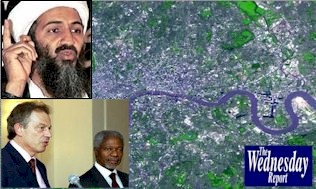

Volume 18, Number 17, April 21, 2004
Lakhdar Brahimi May Have Solution To Interim Iraq Governance
Welcoming the highly constructive recommendations made by United Nations special envoy Lakhdar Brahimi on the creation of an interim government to administer Iraq following the transfer of sovereignty after 30 June, United States representative John Negroponte said this morning that his country looked forward to working closely with him in the coming days.
Briefing the Council on the situation in Iraq, he said the United States appreciated the wide-ranging consultations that Mr. Brahimi had held in Iraq over the last 10 days. But, he noted that the new government would be challenged by those who, even now, were challenging the transitional authority in the country, as well as multi-national force. The transfer of sovereignty would not bring total calm to Iraq and the multi-national force would be needed until Iraqi forces under training could provide total security for their country.
The United States would, therefore, remain involved in Iraq after the transfer of
sovereignty, he said, adding, We will stay the course. The United States was committed to ensuring security for a renewed presence in Iraq both before and after the transfer of sovereignty on 30 June. It would continue to work with the United Nations security assessment team presently in the country.
With the support of the United Nations, the United States had begun to solicit contributions for forces dedicated solely to providing security for the Organization's personnel and facilities. There was a broad desire within the international community for the United Nations to play a role after 30 June and Member States wishing to provide troops to help in that task were urged to contact the United States delegation or those of other Coalition members as soon as possible.
Emphasizing that there was no place in Iraq for armed militias, he said it was the multi-national force's objective to prevent any party from exercising influence through violence. The Coalition Provisional Authority was in productive negotiations to ensure the reintegration of armed bodies that were not under government control and the multi-national force would have no choice but to deal firmly with those who refused to negotiate.
Against the backdrop of deepening unrest in Baghdad and with the spate of increasingly brutal violence in outlying Iraqi cities and towns since the beginning of the month, he said, the multi-national force remained committed to the creation of a democratic, peaceful and stable Iraq, living at peace with its people and neighbours. It would stay the course in the face of the continuing threat posed by insurgent forces, loyalists of the former regime and terrorists who had infiltrated the country from outside.
He said the multi-national force had conducted the full spectrum of military affairs, including offensive combat operations when necessary, as well as reconstruction and other activities. The initial focus of reconstruction had been the restoration of electricity, public facilities and business. Engineering units had been critical to restoring those services to pre-conflict levels. In addition, multi-national force tactical units had assisted in local construction of schools, hospitals, post offices and other public buildings. They had also disposed of thousands of tons of explosives, including mines, and helped to distribute the new Iraqi currency.
In addition to the multi-national force's broad-based efforts, he said, a long-term objective was the training and equipping of Iraqi forces to provide security. Significant progress had been made, given the vacuum caused by the dissolution of the Iraqi army and police force. Iraqis continued to sign up and 75,000 police recruits were in training as at the beginning of April. Some 32,000 members of a civil defence corps would support police efforts, providing fixed-site security, convoy security, patrols, cordons and checkpoints.
Publisher and Editor In Chief:
Micheal John O'Brien
The Wednesday Report is published and printed weekly in hard copy by MPRM Group Limited
Telephone: {905} xxx-xxxx use email contact